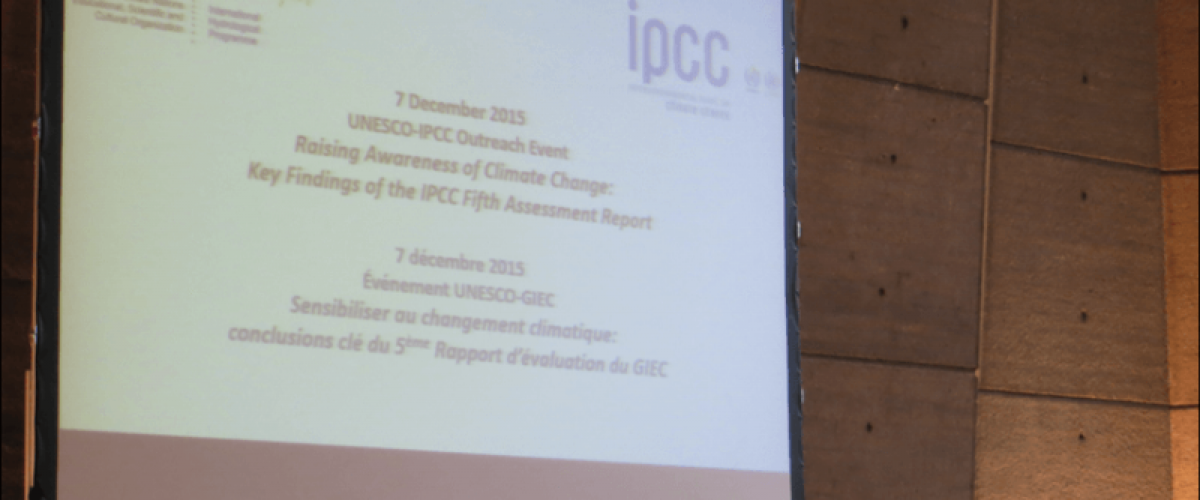The Cousteau Society participated in the IPCC event hosted by UNESCO-IHP
During the COP21, IPCC and UNESCO-IHP promoted a side event to discuss the key findings of the 2014 Report on Climate Change with special session about Science and Policy dialogue and a seminar on education and climate change. The Cousteau Society was represented by Ms. Marcella Silva, Education and Communication Project Manager, who pointed out the question about the special report on ocean, in order to have the update of its current development. The Secretary of IPCC, Mr. Bruce Stewart responded saying that many countries already agree with its adoption, such themes have been discussed during the 41st IPCC session. He highlighted the importance of this report but added that for its establishment, IPCC demands more volunteer research from scientists, as a source of data.
What is the importance of an IPCC Ocean special report?
The IPCC (International Panel on Climate Change) is a scientific body under the auspices of the United Nations (UN). It reviews and assesses the most recent scientific, technical and socio-economic information produced worldwide relevant to providing a climate change report. The panel does not conduct any research nor does it monitor climate related data or parameters. Thousands of scientists from all over the world contribute to the work of the IPCC on a voluntary basis.
The authors producing the reports are currently grouped in three working groups – Working Group I: the Physical Science Basis; Working Group II: Impacts, Adaptation and Vulnerability; and Working Group III: Mitigation of Climate Change. The IPCC Fifth Assessment Report (AR5) which increased its focus on the oceans.
Because of its scientific and intergovernmental nature, the IPCC embodies a unique opportunity to provide rigorous and balanced scientific information to decision makers.
The Oceans have a essential role to regulate atmospheric conditions, to stabilize global temperature, and to provide food and resources to hundreds of millions of people throughout the world. It is however heavily influenced by the rapid rise of carbon dioxide and other greenhouse gases in the atmosphere, putting marine ecosystems, people, and industries at risk.
In the meeting in Nairobi in February 2015, Monaco presented a proposal for an IPCC special report on oceans, noting the multiple beneficiaries of such a report, including the UNFCCC, the Convention on Biological Diversity and the UN Convention on the Law of the Sea. Such a report would send a strong signal regarding the importance of oceans, and should address
regional aspects. Countries such as Peru, India, Malawi and Algeria supported by Madagascar, Chad, Egypt, Mali, Saudi Arabia, Jordan, Spain, the Philippines, Kuwait, added proposing a special report on the link between climate change and desertification.
Japan suggested specific themes that could be pursued, such as ocean acidification and sea-level rise, and highlighted the importance of education programmes on oceans, such as UNESCO-IHE Institute for Water Education and the World Climate Research Programme.
During the Ocean Forum day in COP21, the Environment Minister of France, Ms. Segolene Royal also supported the adoption of the Special Report on Ocean.
Looking forward to the COP22 in Marrakesh, the IPCC in April 2016 will have the opportunity to discuss the inclusion of a Special Report on the Ocean during the drafting period of the Evaluation Report on Climate Change AR6.
Source : IISD Reporting Services, IPCC



